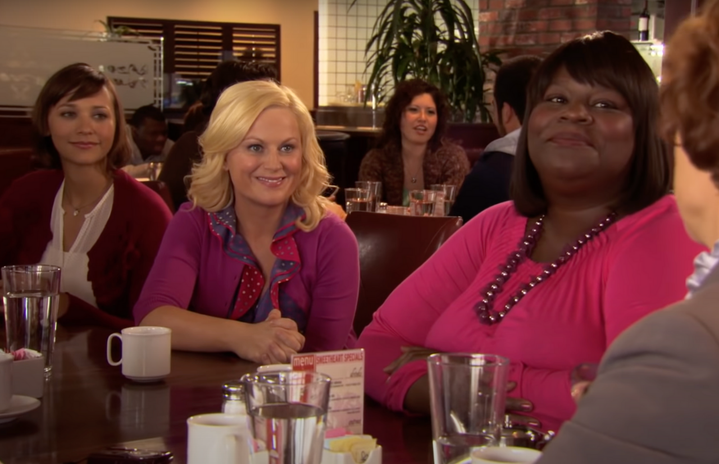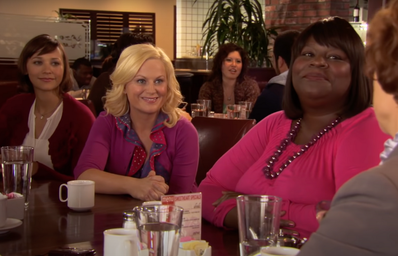Edited by: Kavya Mittal
Brooklyn Nine Nine, Parks and Recreation, The Good Place and The Office are staples of Gen Z pop culture, arguably making them some of the essentials of modern comedy. Apart from being lighthearted, decently funny, and for the most part wholesome, the bluntest reason I never hesitated before hitting the next episode icon is simply the safety within Schurian worlds. But why do we love Michael Schur’s shows so much? Popular comedy (across languages) has always thrived on taking shots at women, queer people and people of colour among other minority communities. (Most of) Michael Schur’s shows, however, have refreshingly debunked the writing of comedy at the expense of women. There are countless questionable moments in his shows, but thanks to the increasing gender and racial diversity in his writer’s room, many of his characters say just the right things.
Before I go deeper into this article, allow me to establish that I am a massive fan of Schur’s ingenuity. Over the years, what I look for in a good show has transformed considerably, but the change is not complex. My needs as a viewer are simple. I do not necessarily need shows with feminist comedy. I just need some with comedy that isn’t at the expense of minorities. And I assume that many of you want the same.
Michael Schur’s Misses
Schur’s shows have often been upheld as feminist masterpieces that project all the right values with a fitting overlay of humour. But as hard as he may try, there are some undeniable misses. Parks and Recreation, for instance, is what is mostly referenced to Michael Schur’s benefit. The show follows an ambitious but fiercely compassionate government official, Leslie Knope (Amy Poehler), who puts public service and friendship before anything else. She is a well rounded character, remarkably successful and is explicitly feminist. However, even in this seemingly feminist arc, Leslie is often an enabler of misogyny and racism. Her colleague, Tom Haverford (Aziz Ansari), is constantly given a pass for being exasperatingly inconsiderate to women. This blatant dismissal of Tom as a ‘playfully charming guy who’s good at heart’ is among the most dangerous characterisation one could craft in writing. This feeds into the familiar trope of ‘boys will be boys,’ sowing the seeds of a routine of dismissing passive acts of sexual harassment as playful behavior. Leslie’s character also often flaunts the privilege of race and status in her actions. In an episode set in a strip club, she goes on to question a stripper for her ‘lifestyle choice.’ Considering that Poehler herself, among other women, have contributed to the writing of the series, this was a blatantly disappointing moment that took me by surprise.
Michael Schur’s recreation of The Office, although grossly popular across at least two generations, is by far my least favorite sitcom. Brimming with error comedy and uncomfortably regressive jokes, the humor algorithm of The Office unsurprisingly amuses a majority. The women in the Office are remarkably poorly written, with little to no storylines devoid of men. While acknowledging its status as a cult classic amidst sitcom lovers, and despite having writers like Mindy Kaling in the writer’s room, I truly believe that The Office was a horrible failure in Vy’s-self-curated-benchmark-for-measuring-Michael-Schur’s-feminism.
Why then, do we love Schurian shows so much?
One of the characteristic traits of Schur’s showrunning is that there is genuine reception to feedback from the audience. P&R was underwhelming in its pilot season, with a protagonist attempting to mirror the Office’s Michael Scott. From the second season however, the show, having found its footing, has only moved upwards. In my opinion, this was because it served the very thing that was lacking in the Office. Feminism. Parks and Rec gave the world unashamedly powerful female friendships, emotionally vulnerable men and wholesome humor that doesn’t dunk on women. Just like Leslie, I hold all my girlfriends dearly close, love them fiercely and would go to great extents for them. All of its characters, especially the women, are fleshed out with great care and love, adorning contrasting personalities that are fittingly reflective of the woman in my own life.
Schur’s younger conceptions like Brooklyn Nine Nine and The Good Place reflect the effort he puts into delivering to a growing audience, one that expects more and expects differently. These two can be seen as proof that he learns from his mistakes, or at least tries to. While P&R quite heavily revolved around (heterosexual) love and marriage, B99 gave Rosa Diaz a refreshing finale where she explicitly rejects the general obsession over settling with a partner. A central character’s ‘happily-ever-after’ does not necessarily entail another human to be permanently in their bed. Both Jake Peralta and Ben Wyatt make professional sacrifices for their partners (in B99 and P&R respectively), challenging the age-old motif of women sacrificing for men and being lauded as virtuous for the same.
Is Michael Schur the most feminist showrunner of today’s television? Absolutely not. Has he made some aching misses at his attempt at inclusion? Of course. But what’s assuring is that he has undoubtedly propelled the possibility that successful comedies can be created without throwing gender minorities and people of color under the bus.


